【优质文档】五年级英语上册1-8单元知识汇总
新译林版五年级英语上册1-8单元重点知识(全册)

17. go home 回家
18. too high 太高 19. great fun 很有趣
20. a computer room 电脑房
21. go and play 去玩玩 【语法知识】
22. It ’s time for dinner. 该吃饭了。
23. play again 再玩一次
一、 Are there any computer rooms? 有电脑房吗?
其余的变序数词大多数是在基数词后加 th. 例如:
one — first, two — second, three — third,
four — fourth, five — fifth,
eight — eighth,
nine — ninth…
方法口诀: 口诀
基变序,有规律,后面
解说 th 加 在数词后面加 th。
5. floor 楼层 6. computer 电脑
7. third 第三
8. first 首先 9. swing 秋千
10. push 推 11. heavy 重的,沉的 【词组短语】
12. stop 停下,停止
13. high 高的
14. great 很多的,极大地
1. a new student 一名新来的学生
There isn’t any milk in the fridge. (同义句) There is no milk in the fridge. (not any = no)
感叹句经常以 how 和 what 开头,表示对某(些)事物表示感慨,一般翻译成:多么
,, 啊!
how 后面直接跟形容词, what 后面直接跟一个词组。如:
1.--Are there any apples in the fridge? 冰箱里有一些苹果吗 ?
英语五年级上册各单元基础知识(带答案)

英语五年级上册各单元基础知识(带答案)五年级英语上册词汇、句子归纳总结unit1whichdoyoulikebetter?词汇:鸡肉chicken鱼肉fish三明治sandwiches汉堡_hamburgers甜甜圈donuts杯型蛋糕cupcakes奶昔milkshake苹果汁applejuice肉meat超市supermarket付款pay英语english语文chinese科学science书法calligraphy体育pe美术art数学maths音乐music学科subject困难的difficult画drawing读书reading养鸟keepbirds种花growflowers扔沙包throwbeanbags跳绳jumprope绵羊sheep熊bear分钟minute写上,放puton句子:1.小鸡鱼,你喜欢哪种鱼?你喜欢哪一种,鸡肉还是鱼?我更喜欢鱼我更喜欢鱼2。
你最喜欢哪门课?你最喜欢哪门课?ilike__chinese___best.idobestin_chinese_______.我最喜欢语文,我语文学的最好。
3.ilike___reading____,butilike_drawing____better.___我喜欢读书,但是我更喜欢画画。
词汇:sorry.ineedtofinishmyhomeworkfirst.抱歉,我要先完成我的作业。
3.thebikeisbroken.shallwefixitthisafternoon?自行车坏了,下午我们一起修一下好吗?yes,let’s.好的,我们一起修吧。
第三单元中秋节还有什么值得纪念的吗?词汇:中秋节themid-autumnfestival重阳节thedoubleninthfestival元宵节thelanternfestival端午节thedragonboatfestival春节thespringfestival农历thechinesecalendar万圣节halloween感恩节thanksgiving复活节easter圣诞节christmas短语:全家人聚在一起吃月饼和水果享受满月爬山探望爷爷看望客人穿好衣服敲门敲门说“不给糖就捣蛋”寻找复活节彩蛋有窝蛋句子:1.whenisthemid-autumnfestival/thedoubleninthfestival?中秋节/重阳节在什么时候?这是中国日历上的第十五天。
人教版小学英语五年级上册各单元知识点
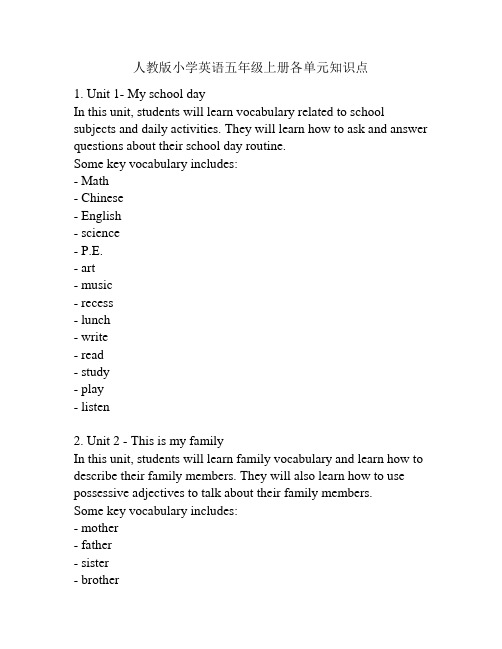
人教版小学英语五年级上册各单元知识点1. Unit 1- My school dayIn this unit, students will learn vocabulary related to school subjects and daily activities. They will learn how to ask and answer questions about their school day routine.Some key vocabulary includes:- Math- Chinese- English- science- P.E.- art- music- recess- lunch- write- read- study- play- listen2. Unit 2 - This is my familyIn this unit, students will learn family vocabulary and learn how to describe their family members. They will also learn how to use possessive adjectives to talk about their family members.Some key vocabulary includes:- mother- father- sister- brother- grandmother- grandfather- aunt- uncle- cousin- daughter- son- possessive adjectives (my, your, his, her)3. Unit 3 - At the zooIn this unit, students will learn vocabulary related to animals and their habitats. They will also learn how to talk about what animals can do (i.e. run, swim, fly, etc.).Some key vocabulary includes:- lion- tiger- elephant- giraffe- monkey- panda- kangaroo- penguin- habitat (forest, desert, ocean, etc.)- can/can't4. Unit 4 - My homeIn this unit, students will learn vocabulary related to the rooms in a house and furniture. They will also learn how to use prepositions to describe where things are in a room.Some key vocabulary includes:- living room- kitchen- bedroom- bathroom- dining room- sofa- table- chair- bed- closet- prepositions (on, under, next to)5. Unit 5 - My scheduleIn this unit, students will learn how to talk about their daily schedules and activities. They will also learn vocabulary related to time and daily routines.Some key vocabulary includes:- wake up- brush teeth- take a shower- go to school- come home- eat dinner- do homework- bed time- time (hour, minute, second)6. Unit 6 - My hobbiesIn this unit, students will learn how to talk about their hobbies and interests. They will also learn vocabulary related to differenthobbies and sports.Some key vocabulary includes:- play soccer- dance- sing- draw- swim- ride a bike- play the piano- watch TV- read books- hobby- interest7. Unit 7 - Our worldIn this unit, students will learn vocabulary related to different countries and cultures. They will also learn how to ask and answer questions about different places in the world.Some key vocabulary includes:- country- flag- language- symbol- landmark- continent- questions (What's the capital of...? What language do they speak in...?)8. Unit 8 - Let's celebrate!In this unit, students will learn vocabulary related to holidays andcelebrations. They will also learn about different traditions and customs around the world.Some key vocabulary includes:- Halloween- Thanksgiving- Christmas- New Year's Day- Valentine's Day- Easter- tradition- custom- celebrateOverall, these units will help students develop their language skills in various areas such as vocabulary acquisition, grammar usage, and communication. By the end of the fifth grade, students will have a foundation of English language that will prepare them for more complex language use in the future.In addition to the vocabulary and grammar covered in these eight units, there are also important language skills that students will develop, such as reading comprehension and writing ability. Throughout the units, students will be completing various reading activities to help them understand and contextualize the new vocabulary and grammar they are learning. They will also be practicing writing skills, such as paragraph writing and short answer responses.Reading comprehension is a vital skill for English language learners, as it helps students to understand and interpret new information. In each unit, there will be reading passages related to that unit's topic. For example, in Unit 3, students may read aboutdifferent animal habitats and learn how animals adapt to their environment. Reading comprehension activities may include reading comprehension questions, matching exercises, and writing exercises. By the end of each unit, students should have a solid understanding of the reading material and be able to answer questions related to the content.Writing is another essential skill that students will develop throughout these units. Writing exercises will be incorporated into each unit, helping students to practice writing in English and apply the new vocabulary and grammar they are learning. Some writing exercises may include writing short paragraphs about their hobbies or describing their family members. By the end of the fifth grade, students should be able to write coherent paragraphs with proper grammar, spelling, and punctuation.Speaking and listening skills will also be developed through group and partner activities in each unit. Students will be encouraged to ask and answer questions in English, and engage in conversations with their peers. They will also have opportunities to give short presentations on topics related to each unit, which will help them develop their public speaking skills.Overall, these eight units are designed to provide a comprehensive language learning experience for students in fifth grade. By the end of the program, students should be able to understand and use everyday English vocabulary and grammar in a variety of contexts. They should also be able to read and comprehend short passages, write short paragraphs independently, and engage in conversations and presentations with their peers. It is important to note thatlanguage learning is a gradual process, and students will vary in their language proficiency at the end of the program. However, with consistent practice and dedication, students in fifth grade will be well-prepared for more advanced language learning in the future.。
小学五年级英语上册主要知识点

五年级上册主要知识点第一单元:1、以字母y结尾的名词变复数,如果字母y的前面是元音(a, e , i, o, u),就在y后面直接加s。
如:boy—boys. 如果字母y前面是辅音,则把y变为i, 再加es. 如:lady—ladies city—cities story--stories.2、动词的第三人称单数:(所谓第三人称单数,就是指既不是你也不是我的另外一个人,可以是具体的人名,他,她,或它,也可以是称呼类,如my mother, my friend等。
当一个句子中的人物是第三人称单数,并且这个句子又是一般现在时态时,该句子中的动词要使用第三人称单数形式。
)have—has like—likes do—does go—goes watch--watches3、词语变化:fun(形容词形式)――funny funny(名词形式)――fun know(同音词)――nohe(宾格形式)---him反义词:tall—short long—short young—old new—old strong—thin fat—thinkind—strict active—quiet4、be like与do like: 在本单元中,What’s …like?的句型是主句型,这里的like是“像…一样”的意思. What’s …like?是问某某长得什么样子,同学们千万别和like的另一个意思“喜欢”相混了。
它的答语一般用:He/She/ It is…(后面跟描写人的外貌特征的词语),如:What’s your father like?你爸爸长得什么样子?。
而在do like的句子中,like的意思才是“喜欢”的意思。
如:What does your father like? 你爸爸喜欢什么?第二单元:1、当询问别人喜欢哪些课程时,classes应当用复数形式,因为别人喜欢的课程可能不止一门。
What classes do you like? 你喜欢哪门课程?2、表示星期几的七个单词,开头第一个字母都要大写。
五年级英语上册知识点归纳
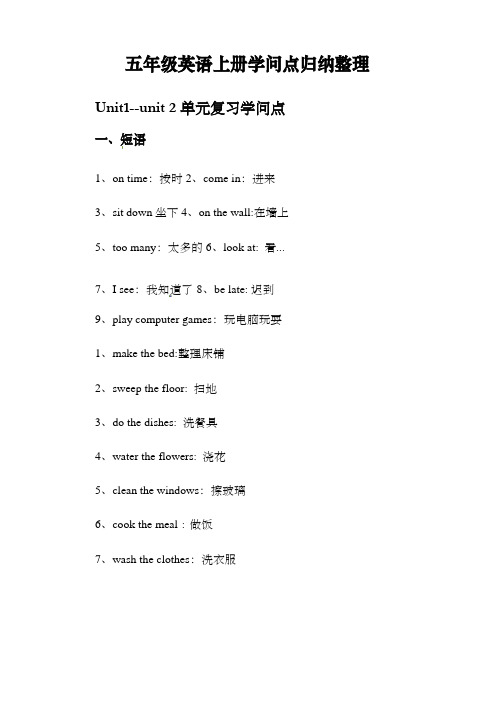
五年级英语上册学问点归纳整理Unit1--unit 2 单元复习学问点一、短语1、on time:按时2、come in:进来3、sit down 坐下4、on the wall:在墙上5、too many:太多的6、look at: 看...7、I see:我知道了8、be late: 迟到9、play computer games:玩电脑玩耍1、make the bed:整理床铺2、sweep the floor: 扫地3、do the dishes: 洗餐具4、water the flowers: 浇花5、clean the windows:擦玻璃6、cook the meal : 做饭7、wash the clothes:洗衣服8、Of course: 固然、固然可以9、You are helpful: 你真乐于助人10、at home:在家11、help...do...:帮助某人做...12、Let me try: 让我试试13、can+动词原形:可以\会\能做...二、重点句子1、what time is it? 现在几点了?答:It”s +时间:现在...2、May I come in? 我可以进来吗?答:Come in,please。
请进。
3、I”m sorry。
对不起。
答:That’s all 。
r i没g h关t系。
4、You are late again.你又迟到了。
5、What time do you...?你几点...?I...at+时间:我在...点......6、Don’t p lay too many computergames and go to bed early.别玩太多电脑玩耍并早点休息。
1.Can I help you?我可以帮你吗?=What can I do for you?我能为你做点什么吗?答:Sure\Yes, can you...?固然,你能 .. ?2.Y ou are( very)helpful. 你真乐于助人。
五年级英语上册1-8单元知识汇总

1.在森林里2.在房子里3.一间漂亮的房子4.又饿又渴5.一些汤6.在桌上7.太冷\太热8.正好9.累了10.三张床11.在房间里12.太硬\太软13.害怕14.四只熊15.在她前面16.吃些蛋糕17.在厨房里18.在冰箱里19.找到他们的表弟20.在门旁21.在他旁边22.得了感冒23.穿上你们的衣服24.在···和···的中间25.在我们中间26.在中国27.一杯牛奶28.in Western countrieas29.be populer30.在课桌上有个苹果。
31.在冰箱里有一杯果汁。
32.在杯子里有些汤。
33.在树上有许多桔子。
34.在树上没有鸟。
35.杯子里没有茶。
36.椅子上没有蛋糕。
37.多么漂亮的一条连衣裙啊!1.一位新学生2.带他参观3.多少个教室4.一个漂亮的音乐室5.一个美术教室6.三个电脑室7.在图书馆旁边8.在操场上9.在我们学校10.在第一层楼11.第二个桔子12.第三幅图片13.一个乒乓球室14.去看一看15.去玩玩16.在秋千上玩17.推他18.太高了19.如此重20.回家21.再玩一次22.该吃晚饭了23.太有趣了24.去电影院25.吃一个美味的冰淇淋26.喝些美味的果汁27.唱歌跳舞28.在冰箱里有一个冰淇淋吗?(肯否定回答)29.操场上有些学生吗?(肯否定回答)30.你能带我们参观一下吗?31.在树上有多少只鸟?有五只。
32.音乐教室在哪里?它在二楼。
33.你的鞋子在哪里?在门后。
34.这把尺是谁的?是刘涛的。
35.它们是谁的手套?是我爸爸的。
36.在你房间里有什么?有一张床和一些书。
1.我们的动物朋友2.一个动物朋友3.大眼睛4.大身体5.没有腿和手臂6.长尾巴7.大耳朵8.一张大嘴巴9.两个翅膀10.十条腿11.跑和跳12.讲话和飞13.在中国14.在美国15.在加拿大16.在澳大利亚17.我有两个动物朋友。
五年级上册第一单元英语知识点
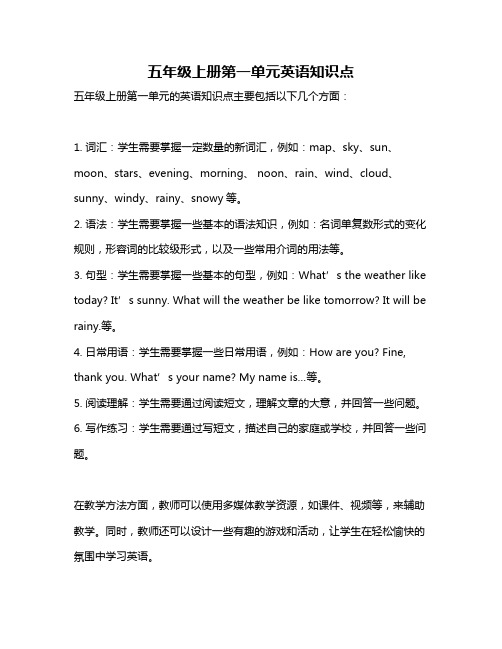
五年级上册第一单元英语知识点
五年级上册第一单元的英语知识点主要包括以下几个方面:
1. 词汇:学生需要掌握一定数量的新词汇,例如:map、sky、sun、moon、stars、evening、morning、 noon、rain、wind、cloud、sunny、windy、rainy、snowy等。
2. 语法:学生需要掌握一些基本的语法知识,例如:名词单复数形式的变化规则,形容词的比较级形式,以及一些常用介词的用法等。
3. 句型:学生需要掌握一些基本的句型,例如:What’s the weather like today? It’s sunny. What will the weather be like tomorrow? It will be rainy.等。
4. 日常用语:学生需要掌握一些日常用语,例如:How are you? Fine, thank you. What’s your name? My name is…等。
5. 阅读理解:学生需要通过阅读短文,理解文章的大意,并回答一些问题。
6. 写作练习:学生需要通过写短文,描述自己的家庭或学校,并回答一些问题。
在教学方法方面,教师可以使用多媒体教学资源,如课件、视频等,来辅助教学。
同时,教师还可以设计一些有趣的游戏和活动,让学生在轻松愉快的氛围中学习英语。
五年级上册英语知识点可打印

五年级上册英语知识点可打印以下是五年级上册英语部分知识点,可进行相应调整:Unit 1 单元知识点词汇map 地图cup 杯子ruler 尺子pencil 铅笔bag 包school 学校book 书chair 椅子desk 书桌句型This is a ... 这是一个...What’s in the ...? ...里面有什么?It’s a ... 它是...Unit 2 单元知识点词汇clock 时钟watch 手表computer 电脑television 电视phone 手机room 房间bed 床sofa 沙发fridge 冰箱table 桌子句型Where’s the ...? 哪里是...?It’s on/in/under the ... 它...上/里/下。
Can you ...? 你能...吗?Yes, I can. / No, I can’t. 是的,我能。
/ 不,我不能。
Unit 3 单元知识点词汇cake 蛋糕bread 面包hot dog 热狗milk 牛奶juice 果汁water 水Coke 可乐tea 茶hamburger 汉堡包French fries 薯条egg 鸡蛋apple 苹果banana 香蕉orange 橙子peach 桃子pear 梨子watermelon 西瓜strawberry 草莓chicken 鸡肉fish 鱼肉lamb 羊肉beef 牛肉pizza 比萨饼noodles 面条rice 米饭bread loaf 面包含三个小面包,也称作bread rolls。
人教精通版五年级英语上册各单元知识点汇总

人教精通版五年级英语上册各单元知识点汇总Unit 1 We have new friends.单元知识必备清单重点词汇hello 喂;嗨(招呼用语)am 是I’m=I amwhere 哪里are 是you 你;你们from 从what 什么is 是your 你的;你们的name 名字what’s=what is Britain 英国Australia 澳大利亚New Zealand 新西兰France 法国Germany 德国Russia 俄罗斯city 城市road 道路street 街道重点短语come here 到这里来come from 来自welcome to... 欢迎来到……重点句型1. I’m Bob. I’m eleven. 我是鲍勃。
我11 岁。
解读:在向别人进行自我介绍时,常用“I’m...”句型表示“我是……”。
该句型主要用于介绍自己的名字、年龄、身材等。
2. —Where are you from? 你来自哪里?—I’m from France. 我来自法国。
解读:问句是由where 引导的特殊疑问句,用来询问某人来自哪里。
句型结构:—Where + be 动词+ 主语+ from? —主语+ be动词+ from + 地点名词。
同义句:—Where do you come from? 你来自哪里?—I come from Germany. 我来自德国。
本句也是询问某人来自哪里,句中有实义动词come, 因此必须借助助动词do 的相应形式来构成问句。
3.—What’s your name?你的名字是什么?—My name is Cathy.我的名字是凯茜。
解读:本句用来询问对方的姓名。
what’s 是what is 的缩写形式。
my 和your 是形容词性物主代词。
句型结构::—What’s your name? —My name is + 名字/ I’m + 名字.4. —Where do you live, Cathy?你住在哪里,凯茜?—I live in the Happy City. 我住在幸福城。
五年级上册英语Unit1-Unit8基础词汇
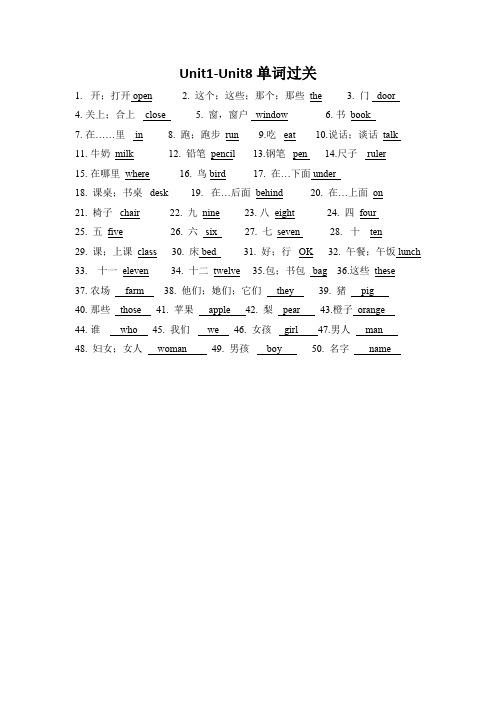
1.开;打开open2. 这个;这些;那个;那些the3. 门door4.关上;合上close5. 窗,窗户window6.书book7.在……里in 8. 跑;跑步run 9.吃eat 10.说话;谈话talk 11.牛奶milk 12. 铅笔pencil13.钢笔pen14.尺子ruler15.在哪里where 16. 鸟bird17. 在…下面under18. 课桌;书桌desk 19. 在…后面behind 20.在…上面on21. 椅子chair 22. 九nine23.八eight24. 四four25. 五five26. 六six 27. 七seven28. 十ten29. 课;上课class30. 床bed 31. 好;行OK 32. 午餐;午饭lunch 33. 十一eleven34. 十二twelve35.包;书包bag36.这些these37.农场farm 38. 他们;她们;它们they 39. 猪pig40.那些those 41. 苹果apple 42. 梨pear 43.橙子orange44.谁who 45. 我们we 46. 女孩girl 47.男人man48. 妇女;女人woman 49. 男孩boy 50. 名字name1.开;打开2. 这个;这些;那个;那些3. 门5.关上;合上 5. 窗,窗户6.书8.在……里8. 跑;跑步9.吃10.说话;谈话12.牛奶12. 铅笔13.钢笔14.尺子16.在哪里16. 鸟17. 在…下面18. 课桌;书桌19. 在…后面20.在…上面21. 椅子22. 九23.八24. 四25. 五26. 六27. 七28. 十29. 课;上课30. 床31. 好;行32. 午餐;午饭33. 十一34. 十二35.包;书包36.这些37. 农场38. 他们;她们;它们39. 猪40. 那些41. 苹果42. 梨43.橙子44. 谁45. 我们46. 女孩47.男人48. 妇女;女人49. 男孩50.名字。
五年级上册1到8单元,英语笔记

五年级上册英语笔记1. Unit 1: My School LifeThis unit introduces vocabulary related to school subjects, school facilities, and school activities. Students learn how to talk about their school life and express their likes and dislikes.2. Unit 2: My FamilyIn this unit, students learn to describe their family members and talk about their family life. They also learn about different types of families and how to express love and care for their family.3. Unit 3: My D本人ly RoutineThis unit focuses on teaching students how to describe their d 本人ly routines, including activities they do in the morning, afternoon, and evening. They also learn how to ask and answer questions about d本人ly routines.4. Unit 4: My Free TimeStudents learn vocabulary related to hobbies, sports, and leisure activities in this unit. They practice talking about their free time activities and expressing preferences for different hobbies.5. Unit 5: My CommunityThis unit introduces vocabulary related to places in amunity, such as the supermarket, library, park, and post office. Students also learn how to ask for and give directions to different locations.6. Unit 6: My CountryIn this unit, students learn about different countries and cultures around the world. They learn to talk about national flags, traditional clothing, and famous landmarks.7. Unit 7: My HealthStudents learn vocabulary related to health and wellness in this unit. They learn how to describe symptoms of illness, talk about healthy habits, and express concern for others' well-being.8. Unit 8: My Future GoalsThis unit focuses on teaching students how to talk about their future aspirations and goals. They learn to discuss their career ambitions, educational plans, and dreams for the future.总结:五年级上册的英语学习内容涵盖了学校生活、家庭、日常生活、空余时间、社区、国家文化、健康和未来规划等方面的词汇和话题。
人教版五年级上册英语知识点重点难点考点汇总
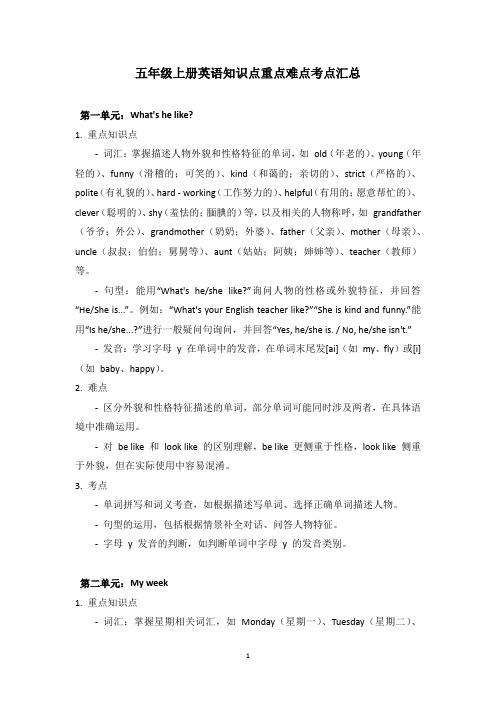
五年级上册英语知识点重点难点考点汇总第一单元:What's he like?1. 重点知识点-词汇:掌握描述人物外貌和性格特征的单词,如old(年老的)、young(年轻的)、funny(滑稽的;可笑的)、kind(和蔼的;亲切的)、strict(严格的)、polite(有礼貌的)、hard - working(工作努力的)、helpful(有用的;愿意帮忙的)、clever(聪明的)、shy(羞怯的;腼腆的)等,以及相关的人物称呼,如grandfather (爷爷;外公)、grandmother(奶奶;外婆)、father(父亲)、mother(母亲)、uncle(叔叔;伯伯;舅舅等)、aunt(姑姑;阿姨;婶婶等)、teacher(教师)等。
-句型:能用“What's he/she like?”询问人物的性格或外貌特征,并回答“He/She is...”。
例如:“What's your English teacher like?”“She is kind and funny.”能用“Is he/she...?”进行一般疑问句询问,并回答“Yes, he/she is. / No, he/she isn't.”-发音:学习字母y 在单词中的发音,在单词末尾发[ai](如my、fly)或[i](如baby、happy)。
2. 难点-区分外貌和性格特征描述的单词,部分单词可能同时涉及两者,在具体语境中准确运用。
-对be like 和look like 的区别理解,be like 更侧重于性格,look like 侧重于外貌,但在实际使用中容易混淆。
3. 考点-单词拼写和词义考查,如根据描述写单词、选择正确单词描述人物。
-句型的运用,包括根据情景补全对话、问答人物特征。
-字母y 发音的判断,如判断单词中字母y 的发音类别。
第二单元:My week1. 重点知识点-词汇:掌握星期相关词汇,如Monday(星期一)、Tuesday(星期二)、Wednesday(星期三)、Thursday(星期四)、Friday(星期五)、Saturday(星期六)、Sunday(星期日),以及课程和日常活动词汇,如Chinese(语文)、English(英语)、maths(数学)、science(科学)、music(音乐)、PE(体育)、art(美术)、wash my clothes(洗衣服)、watch TV(看电视)、do homework(做作业)、read books (读书)等。
五年级上册英语单元考点

五年级上册英语单元考点五年级上册英语通常涵盖一系列的单元和主题,每个单元都有其特定的考点和重点。
以下是可能包含在五年级上册英语课程中的一些单元考点:Unit 1: Greetings and Introductions问候语和介绍:学生需要学会用英语进行基本的问候和自我介绍。
Unit 2: Numbers and Counting数字和计数:学生需要掌握基本的数字和计数,包括数字的读法和书写。
Unit 3: School Life学校生活:学生学习有关学校、教室、课程等方面的词汇和表达方式。
Unit 4: My Family and Friends我的家庭和朋友:学生学习家庭成员、朋友以及相关的描述性词汇。
Unit 5: Daily Routines日常生活:学生学会描述每天的日常活动和常见动词的用法。
Unit 6: Food and Healthy Habits食物和健康习惯:学生学会有关食物、饮食和健康方面的词汇和表达。
Unit 7: Hobbies and Leisure Activities爱好和休闲活动:学生学习描述自己的爱好和参与休闲活动时的表达方式。
Unit 8: Weather and Seasons天气和季节:学生学习有关天气和季节的词汇,以及描述天气状况的表达。
Unit 9: Holidays and Celebrations节日和庆典:学生学习有关不同节日和庆典的词汇和文化知识。
Unit 10: Travel and Transportation旅行和交通工具:学生学会描述旅行和不同交通工具的词汇和表达方式。
这些单元考点可能包括词汇、语法、听力、口语和阅读等方面。
具体的考点和要求可能会因学校、地区和教材的不同而有所变化。
建议学生在学习每个单元时重点关注相关的语言技能和知识点,并进行适当的练习和巩固。
苏教版五年级英语上册1-8单元知识点汇总
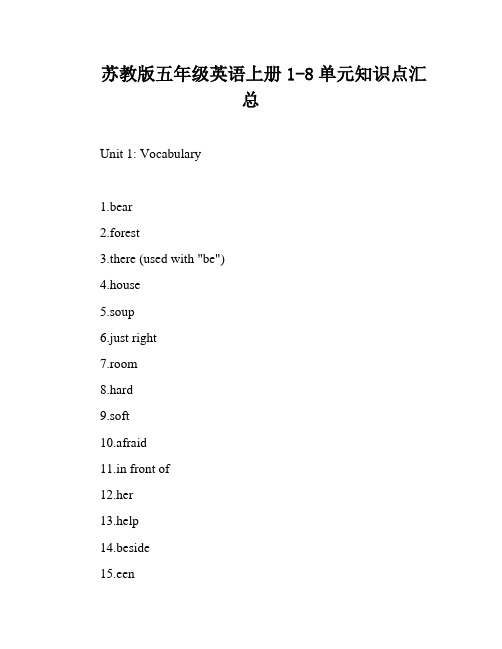
苏教版五年级英语上册1-8单元知识点汇总Unit 1: Vocabulary1.bear2.forest3.there (used with "be")4.house5.soup6.just right7.room8.hard9.soft10.afraid11.in front of12.her13.help14.beside15.een16.really17.then18.find19.their Phrases:1.in the forest2.a beautiful house3.in the house4.hungry and thirsty5.some soup6.on the table7.too cold8.too hot9.in the room10.too hard11.too soft12.just right13.be afraid14.three bears15.in front of her16.a glass of milk17.have a cold18.put on your coats19.in China20.have some cakes21.in the kitchen22.in the fridge23.een the windows and the door24.find their cousinUnit 1: Sentences1.There is a house in the forest.2.There is some soup on the table.3.There are three bears in front of her.4.This soup is too cold.5.Goldilocks is in the forest.6.What a beautiful house!7.She is both hungry and thirsty.8.There are no cakes available here.9.Would you like to have some cake?10.Bobby cannot see any cakes in the fridge.Vocabulary:1.student - a person who is studying at a school or university2.show。
(完整版)五年级英语上册各单元知识点总结

新版PEP五年级上册知识点总结Unit 1 What ’s he like?重点单词old 老的,年纪大的young 年轻的,岁数不大的funny 滑稽的,可笑的kind 体贴的,慈祥的,宽容的strict 要求严格的,严厉的polite 有礼貌的,客气的shy 羞怯的,腼腆的,怕生的helpful 有用的,愿意帮忙的clever 聪明的,聪颖的hard-working 工作努力的,辛勤的music 音乐art 美术science 科学English 英语maths/math 数学Chinese 语文,中文sometimes 有时,间或robot 机器人speak 会说,会讲(某种语言);用(某种语言)说话重点句子1. —Who’s your art teacher? 谁是你的美术老师?—Mr. Jones. 琼斯老师。
2. —Is he young? 他年轻吗?—Yes, he is. 是的,他年轻。
—No, he isn ’t. 不,他不年轻。
3. —What’s Wu Yifan like ?吴一帆怎样?—H e’s hard-working.他很勤奋。
4. Ms Wang will be our new Chinese teacher.王老师会成为我们的新语文老师。
5. He is very helpful at home .他在家很能干。
6. Robin is short but strong.罗宾个子矮,但是身体强壮。
7. He can speak Chinese and English .他会说中文和英语。
8. He makes me finish my homework. 他让我写作业。
语音字母y 在单词中的发音:1、双音节或多音节词末发[ i ] 。
例:baby happy windy sunny sorry candy many family party 婴儿开心的有风的晴朗的对不起糖果许多家庭聚会课外补充:2、y 在单音节词末发[ ai ]例:by 乘坐my 我的why 为什么cry 哭fly 飞重点知识及语法1、询问他人的外貌或性格:-What’s he/she like?- He/She is kind/2、一般疑问句的问与答:—Is he/she ?—Yes, he/she is.—No, he/she isn ’t.—Do you know ?—Yes, I do.—No, I don ’t3、be 动词的三种形式am, is, are 与人称代词连用的用法:I + am, 识记口诀:我用am, 你用are, is 用于他、她、它,所有复数都用are 。
五年级上册英语第一单元知识总结
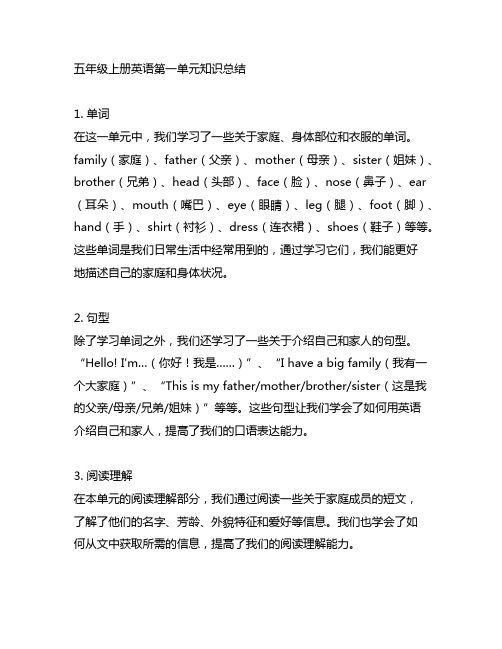
五年级上册英语第一单元知识总结1. 单词在这一单元中,我们学习了一些关于家庭、身体部位和衣服的单词。
family(家庭)、father(父亲)、mother(母亲)、sister(姐妹)、brother(兄弟)、head(头部)、face(脸)、nose(鼻子)、ear (耳朵)、mouth(嘴巴)、eye(眼睛)、leg(腿)、foot(脚)、hand(手)、shirt(衬衫)、dress(连衣裙)、shoes(鞋子)等等。
这些单词是我们日常生活中经常用到的,通过学习它们,我们能更好地描述自己的家庭和身体状况。
2. 句型除了学习单词之外,我们还学习了一些关于介绍自己和家人的句型。
“Hello! I'm…(你好!我是……)”、“I have a big family(我有一个大家庭)”、“This is my father/mother/brother/sister(这是我的父亲/母亲/兄弟/姐妹)”等等。
这些句型让我们学会了如何用英语介绍自己和家人,提高了我们的口语表达能力。
3. 阅读理解在本单元的阅读理解部分,我们通过阅读一些关于家庭成员的短文,了解了他们的名字、芳龄、外貌特征和爱好等信息。
我们也学会了如何从文中获取所需的信息,提高了我们的阅读理解能力。
总结和回顾通过本单元的学习,我们不仅扩充了词汇量,掌握了一些日常生活中常用的句型,还提高了阅读理解能力。
这些知识和能力的提升将为我们以后的学习和生活奠定良好的基础。
个人观点和理解我认为,学习英语不仅可以帮助我们更好地与外国人交流,还可以开拓我们的视野,增加我们的知识储备。
在学习过程中,我们要多听、多说、多读、多写,不断巩固和提高自己的语言能力。
在生活中,我们要勇敢地开口说英语,不要怕出错。
只有不断地尝试和练习,我们的语言表达能力才会越来越好。
希望我们能在以后的学习中保持对英语学习的热情,不断提升自己的能力。
通过以上对五年级上册英语第一单元的知识总结,我们能更全面、深刻和灵活地理解这一主题。
五年级上册英语各单元重点

五年级上册英语各单元重点Unit 1 What's he like?一、重点单词。
1. 描述人物外貌和性格特征的形容词。
- old(老的;年纪大的)、young(年轻的;岁数不大的)、funny(滑稽的;可笑的)、kind(体贴的;慈祥的;宽容的)、strict(要求严格的;严厉的)、polite(有礼貌的;客气的)、hard - working(工作努力的;辛勤的)、helpful (有用的;愿意帮忙的)、clever(聪明的;聪颖的)、shy(羞怯的;腼腆的)。
2. 其他单词。
- will(表示愿意等)、sometimes(有时;间或)、robot(机器人)、him (他,宾格形式,用于动词或介词后)。
二、重点句型。
1. - What's he like?(他是什么样的人?)- He is polite.(他很有礼貌。
)2. - Is she strict?(她严格吗?)- Yes, she is.(是的,她严格。
)/No, she isn't.(不,她不严格。
)3. - Do you know Mr Young?(你认识杨先生吗?)- Yes, I do.(是的,我认识。
)/No, I don't.(不,我不认识。
)4. He can speak Chinese and English.(他会说汉语和英语。
)三、语法重点。
1. 形容词的用法:形容词可以用来描述人或事物的特征,在句子中可以作表语,位于be动词(am/is/are)之后。
例如:She is kind.(她很善良。
)2. 一般疑问句及其回答:一般疑问句以be动词(am/is/are)开头,回答用Yes 或No,后面再接主语和be动词。
例如:Is he funny? Yes, he is.(他有趣吗?是的,他有趣。
)Unit 2 My week.一、重点单词。
1. 表示星期的单词。
- Monday(星期一)、Tuesday(星期二)、Wednesday(星期三)、Thursday (星期四)、Friday(星期五)、Saturday(星期六)、Sunday(星期日)。
五年级上册1-8单元知识点汇总

Unit1 Goldilocks and three bears一、句型:要求会默写。
1. There is a house in the forest.在森林里有一个房子。
2. There is some soup on the table.在桌子上有一些汤。
3. There are three bears in front of her.在她前面有三只熊。
4. This soup is too cold.这汤太冷了。
5. Goldilocks is in the forest.金发女孩在森林里。
6. What a beautiful house! 多么漂亮的房子!7. She is hungry and thirsty.她是又饿又渴。
8. There aren’t any cakes here.这儿没有一些蛋糕。
9. You can have some cakes.你能吃一些蛋糕。
10.Bobby cannot(can’t) see any cakes in the fridge. 波比看不到冰箱里有蛋糕。
二、语言点:要求理解并会运用1.There be句型表示“某处有某物”,be动词用is还是用are遵循下面的原则:①be动词后面如果跟的是单数名词或不可数名词,就用is; There is a pencil case in the school bag. There is some soup/milk /tea/coffee/juice/water/chocolate.②be动词后面如果跟的是可数名词的复数,就用are. There are some desks in the classroom.③be动词后面如果跟的是不止一种物品,就根据离它最近的物品选用is或are.(就近原则) There are some pictures and a telephone. There is a telephone and some pictures.2.There be 句型的否定形式:在be动词的后面加not(is not可以缩写为isn't,are not可以缩写为aren't)把some 改成any。
五年级英语上册知识点重点
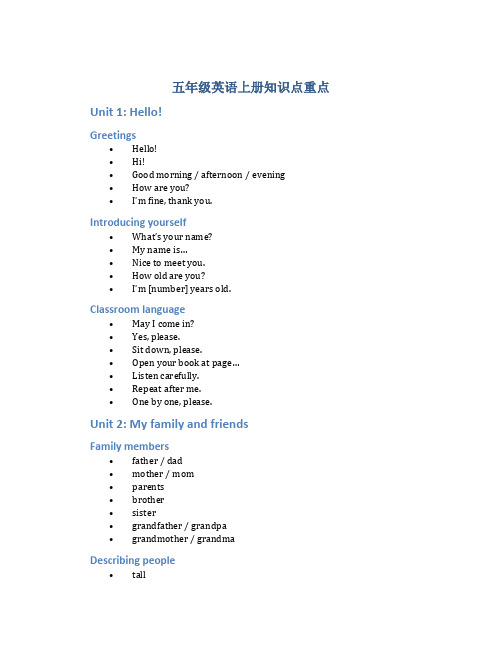
五年级英语上册知识点重点Unit 1: Hello!Greetings•Hello!•Hi!•Good morning / afternoon / evening•How are you?•I’m fine, thank you.Introducing yourself•What’s your name?•My name is…•Nice to meet you.•How old are you?•I’m [number] years old.Classroom language•May I come in?•Yes, please.•Sit down, please.•Open your book at page…•Listen carefully.•Repeat after me.•One by one, please.Unit 2: My family and friendsFamily members•father / dad•mother / mom•parents•brother•sister•grandfather / grandpa•grandmother / grandmaDescribing people•tall•short•thin•fat•curly / straight hair•blue / brown / black eyes•kind / strict / funny Possessive ’s•My [noun]•Your [noun]•His / Her [noun]Unit 3: My schoolClassroom objects•desk•chair•blackboard•chalk•eraser•pen / pencil•ruler•bookSubjects•Math•English•Science•Chinese•History•Geography•Art•MusicTelling the time•What time is it?•It’s [number] o’clock.•It’s half past [number].•It’s quarter past / to [number].Unit 4: Seasons and weather Seasons•spring•summer•fall / autumn•winterWeather•sunny•cloudy•rainy•snowy•windy•hot•coldClothing•T-shirt•pants•dress•skirt•shorts•jacket•sweaterUnit 5: Food and drinks Food•rice•noodles•bread•milk•yogurt•cheese•egg•fruitDrinks•water•tea•coffee•juice•soda / popOrdering at a restaurant•May I have…?•I’d like…•How about…•Can I get…?Unit 6: AnimalsWild animals•lion•tiger•elephant•giraffe•zebra•monkey•kangarooPets•dog•cat•fish•bird•hamster•rabbitDescribing animals•big / small•strong / weak•fast / slow•cute / ugly•friendly / dangerous以上就是五年级英语上册的重点知识点,希望对大家学习英语有所帮助。
苏教版五年级英语上册1-8单元知识点汇总

苏教版五年级英语上册1-8单元知识点汇总Unit 1 单元知识单词1.bear熊2.forest森林3.there(与be连用)有4.house房子5.soup汤6.just right正合适7.room房间8.hard硬的9.soft柔软的10.afraid害怕的11.in front of在……前面12.her她(宾格)13.help救命14.beside在……旁边15.between在……中间16.really真正地17.then然后18.find找到,发现19.their他们的词组1. in the forest在森林里2. a beautiful house一座漂亮的房子3. in the house 在房子里4. hungry and thirsty又饿又渴5.some soup一些汤6. on the table在餐桌上7. too cold太冷了8. too hot太热9. in the room在房间里10. too hard太硬11.too soft太软了12. just right正合适13. be afraid害怕14. three bears三只熊15. in front of her在她前面16. a glass of milk一杯牛奶17.have a cold得了感冒18.put on your coats穿上你们的外套19.in China在中国20.have some cakes吃些蛋糕21.in the kitchen在厨房里22.in the fridge在冰箱里23.between the windows and the door在窗户和门之间24.find their cousin找到他们的表弟句型1. There is a house in the forest.在森林里有一个房子。
2. There is some soup on the table.在桌子上有一些汤。
- 1、下载文档前请自行甄别文档内容的完整性,平台不提供额外的编辑、内容补充、找答案等附加服务。
- 2、"仅部分预览"的文档,不可在线预览部分如存在完整性等问题,可反馈申请退款(可完整预览的文档不适用该条件!)。
- 3、如文档侵犯您的权益,请联系客服反馈,我们会尽快为您处理(人工客服工作时间:9:00-18:30)。
1.在森林里
2.在房子里
3.一间漂亮的房子
4.又饿又渴
5.一些汤
6.在桌上
7.太冷太热
8.正好
9.累了
10.三张床
11.在房间里
12.太硬太软
13.害怕
14.四只熊
15.在她前面
16.吃些蛋糕
17.在厨房里
18.在冰箱里
19.找到他们的表弟
20.在门旁
21.在他旁边
22.得了感冒
23.穿上你们的衣服
24.在···和···的中间
25.在我们中间
26.在中国
27.一杯牛奶
28.in Western countrieas
29.be populer
30.在课桌上有个苹果。
31.在冰箱里有一杯果汁。
32.在杯子里有些汤。
33.在树上有许多桔子。
34.在树上没有鸟。
35.杯子里没有茶。
36.椅子上没有蛋糕。
37.多么漂亮的一条连衣裙啊!
38.那只熊太胖了。
1.一位新学生
2.带他参观
3.多少个教室
4.一个漂亮的音乐室
5.一个美术教室
6.三个电脑室
7.在图书馆旁边
8.在操场上
9.在我们学校
10.在第一层楼
11.第二个桔子
12.第三幅图片
13.一个乒乓球室
14.去看一看
15.去玩玩
16.在秋千上玩
17.推他
18.太高了
19.如此重
20.回家
21.再玩一次
22.该吃晚饭了
23.太有趣了
24.去电影院
25.吃一个美味的冰淇淋
26.喝些美味的果汁
27.唱歌跳舞
28.在冰箱里有一个冰淇淋吗?(肯否定回答)
29.操场上有些学生吗?(肯否定回答)
30.你能带我们参观一下吗?
31.在树上有多少只鸟?有五只。
32.音乐教室在哪里?它在二楼。
33.你的鞋子在哪里?在门后。
34.这把尺是谁的?是刘涛的。
35.它们是谁的手套?是我爸爸的。
36.在你房间里有什么?有一张床和一些书。
1.我们的动物朋友
2.一个动物朋友
3.大眼睛
4.大身体
5.没有腿和手臂
6.长尾巴
7.大耳朵
8.一张大嘴巴
9.两个翅膀
10.十条腿
11.跑和跳
12.讲话和飞
13.在中国
14.在美国
15.在加拿大
16.在澳大利亚
17.我有两个动物朋友。
18.它们没有腿和手臂。
19.它有一个大身体。
20.那个男孩有一个机器人。
21.他们有玩具吗?是的,他们有。
22.它有两条手臂吗?不,它没有。
23.一个是红色的,另一个是黑色的。
24.它能跑和跳。
25.我的动物朋友是黄色和绿色相间的。
26.它会做什么?它会说话和飞翔。
27.它害怕了。
28.那两条不是腿。
它们是手臂。
29.它的身体是硬的。
30.给它一块蛋糕。
31.它喜欢你的手指。
1.喜欢画画
2.喜欢游泳
3.喜欢爬山
4.游泳游得非常好
5.擅长溜冰
6.擅长足球
7.不擅长唱歌
8.弹钢琴
9.观看电影
10.在公园画画
11.跟我一起打乒乓球
12.读故事
13.许多书
14.篮球打得好
15.去爬山
16.谈论
17.他们的爱好
18.有一个主意
19.一个很棒的主意
20.今天下午
21.在冰上溜冰
22.在冰上的一个洞
23.在比利后面
24.注意,当心
25.你们喜欢做什么?我们喜欢看电影。
26.杨玲喜欢做什么?她喜欢弹钢琴。
27.刘涛擅长游泳。
28.杨玲不擅长溜冰。
29.我通常和我弟弟蒂姆在公园里画画。
30.他也喜欢打乒乓球。
31.他们两人都喜欢游泳。
32.我们都喜欢爬山。
33.山姆和比利谈论他们的爱好。
34.山姆有一个主意。
35.今天下午我们一起去溜冰吧。
36.那是一个很棒的主意!
37.比利又冷又湿。
1.教英语
2.许多学生
3.···怎么样?
4.一个英语老师
5.一个语文老师
6.写故事
7.写书
8.在家工作
9.帮助生病的人们
10.许多人
11.一个工厂工人
12.帮我,救我
13.做糖果
14.吃糖果
15.在天空中
16.有一辆漂亮的小汽车
17.喜欢轿车
18.制造轿车
19.如此多的蜡笔
20.在工厂里
21.你是做什么的?我是一名司机。
22.他们是做什么的?他们是农民。
23.你爸爸是做什么工作的?他是一名作家。
24.她是做什么的?她是一名护士。
25.我爸爸是一名老师。
他教英语。
26.她是一名英语老师吗?不,她不是。
27.她是一名作家。
她写故事。
28.你爸爸有一辆漂亮的小汽车。
29.有如此多的小汽车。
30.你爸爸现在不能走了。
31.你老师喜欢看电视吗?是的,她喜欢。
32.我们在工厂里工作。
1.我的朋友
2.在操场上
3.等一会
4.(给···)发一封邮件
5.居住在英国
6.······岁
7.说中文
8.说英语
9.在学校
10.有中文课
11.学习中文
12.在美国
13.放学后
14.去钓鱼
15.在一个小吃店
16.擅长钓鱼
17.教你
18.不要担心。
19.坐在河旁边
20.等啊等
21.有许多鱼
22.吃橘子
23.穿温暖的衣服
24.明天早上
25.你有一位网友吗?是的,我有。
26.他们有一位网友吗?不,他们没有。
27.他有中文课吗?是的,他有。
28.她喜欢什么学科?她喜欢音乐和美术。
29.让我先发送这封邮件。
它是给我网友的。
30.他住在哪里?他居住在英国。
31.他会说英语吗?是的,他会。
32.他放学后学习中文。
33.波比和山姆在小吃店吃鱼。
34.让我们明天一起去钓鱼吧。
35.鱼吃什么?它们吃苹果。
36.它们吃橘子吗?是的。
37.波比等啊等。
1.在周末
2.上网聊天
3.放风筝
4.拜访我的祖父母
5.野餐
6.非常,很
7.和他们的猫玩耍
8.和他们聊天
9.上舞蹈课
10.吃了很多
11.出来
12.出来
13.去游泳
14.去公园
15.和她的朋友们去电影院
16.你周末做什么?我经常和我父母一起吃晚饭。
17.他们周末做什么?他们通常放风筝和野餐。
18.他周末做什么?他有时去公园。
19.她周末做什么?她总是在上舞蹈课。
20.比利总是吃很多。
21.出来打篮球。
22.山姆和比利常常去游泳。
23.哦,我不能出去!
24.足球在英国很受欢迎。
25.当我们拜访露丝先生时,他总是把他种的所有
的美丽的玫瑰花给我们看。
1.在圣诞节
2.圣诞节快乐!
3.在圣诞节
4.很多的快乐
5.看起来很棒
6.看上去很伤心
7.醒得早
8.打开我们的礼物
9.吃一顿大餐
10.玩得开心
11.唱圣诞歌
12.许多圣诞卡
13.一棵圣诞树
14.圣诞夜,平安夜
15.···怎么了?
16.等礼物
17.去看圣诞老人
18.为我们的家人买礼物
19.吃一只火鸡和圣诞布丁
20.把一些漂亮的东西放在圣诞树上
21.我们在圣诞节总是有很多的乐趣。
22.首先,我们为我们的家人和朋友们买礼物。
23.接着,我们把一些漂亮的东西挂在圣诞树上。
24.然后,圣诞夜来了。
25.最后,就是圣诞节。
26.我们早早地醒来,打开我们的礼物。
27.你在圣诞节通常做些什么?
28.人们在圣诞节吃大餐。
29.孩子们把长筒袜放在床上。
30.他怎么了?
31.我们都玩得很开心。
32.不要跳起来,小狗!你会把果汁弄到我的夹克
上。
33.不要跳起来,小猫!你会把你自己弄湿。
